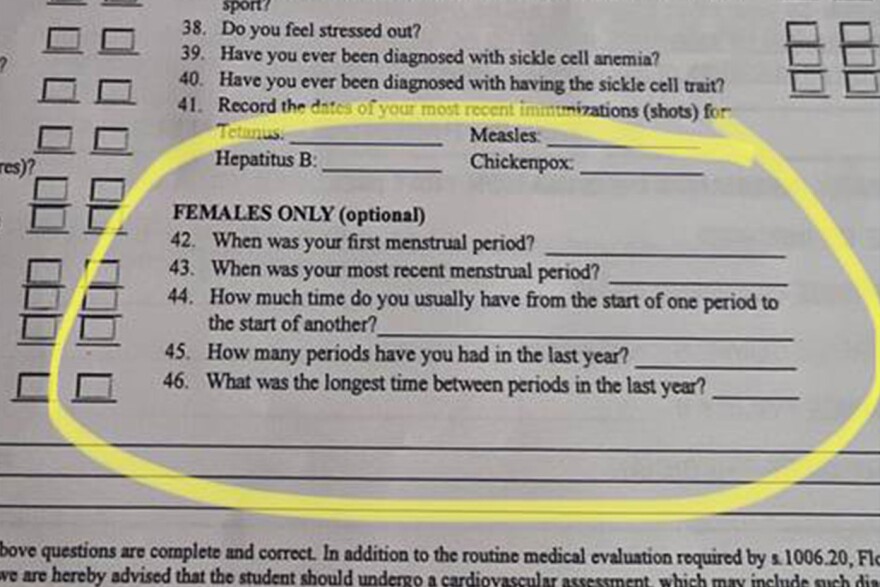After an outcry, a high school athletic board has dropped questions about student athletes’ menstrual cycles from a physical evaluation form.
The Florida High School Athletic Association's board of directors voted 14-2 on Thursday to drop the questions from the Preparticipation Physical Evaluation form. The board was slated later this month to consider making the questions mandatory but held an emergency meeting Thursday after a backlash about the proposal.
Board members Charlie Ward, a former star athlete at Florida State University and NBA player, and Chris Patricca, a Lee County School Board member, voted to keep the questions on the form.
In a less-discussed change to the requirements for Florida athletes, the newly adopted form asks students to list their "sex assigned at birth." The previous version asked only for "sex."
The vote comes after weeks of controversy surrounding questions on the medical form, which is typically filled out by a physician and submitted to schools. The board approved a recommendation by the association's director to remove the questions, which asked for details including the onset of an athlete's period and the date of that person's last menstrual cycle.
The questions, which in the past have been optional to answer, asked about athletes’ first menstrual periods, most recent menstrual periods and how many periods the athletes have had in the past year.
During the emergency meeting, the association's attorney read public comments into the record for about an hour. The comments overwhelmingly opposed requiring athletes to report those details to school athletic officials, citing privacy concerns.
“There is absolutely no reason for the FHSAA to collect such private information and no reason why the schools need it. It is our understanding that if the FHSAA were to implement this menstruation reporting requirement, other school personnel like a coach or athletic director would also have access to this highly sensitive information,” House Minority Leader Fentrice Driskell, D-Tampa, said in a letter to the association board.
The debate comes at a time of heightened concern around reproductive rights in Florida and around the country, after the overturning of Roe v. Wade. Some members of the public also raised concerns that such information could be used to discriminate against transgender athletes.
Patricca, however, argued the questions have a valid medical purpose to help detect abnormalities.
“The factual, medical and clinically proven impact of abnormal menstrual cycles on student athletes is well-established and not remotely controversial. What is controversial is the political pressure that has been placed on the association to look at this through the lens of political hot-button issues,” Patricca said.
Patricca also pushed back against public criticism of the FHSAA board and the questions.
“I make my comments today as a woman, a former female athlete and the parent of a female student-athlete, and I am very much in touch on this issue. So many comments from the public today felt like they were almost from biblical times,” Patricca said. “Menstruation is a perfectly normal bodily function. And, thankfully, embarrassment and shame surrounding menstruation has decreased as our society has evolved.”
FHSAA board member Doug Dodd, who is on the Citrus County School Board, voted to remove the questions, which he said his family chose not to answer.
“First of all, as the father of three daughters who all played middle school and high school sports and completed the preparticipation physical each year, I really understand the concern about making these questions mandatory," Dodd said. "Our family felt that these questions were private, and we chose not to answer those optional questions. But now if the association were to mandate those questions and require them to be answered, I’d have a real problem with that as a parent."
After Thursday’s vote, Senate Minority Leader Lauren Book, D-Davie, thanked the board for not going through with the proposal to make the questions mandatory.
“Tantamount to puberty policing, the FHSAA has agreed that there is absolutely no reason to mandate a student’s private, confidential reproductive health information be reported to anyone but their doctor or their parents — especially when such rules would apply to girls and young women,” Book said in a statement.
Jenn Poggie, CEO of Tallahassee-based communications firm Pinnacle Media, had launched a campaign called “Privacy. Period!” in response to the FHSAA’s proposal. Poggie commended the FHSAA board’s decision in a statement Thursday.
“Requiring reporting on teenage girls’ menstrual cycles on an athletic form is a complete violation of privacy. No female athlete in Florida — or anywhere else — should have to disclose this deeply personal information to an athletic department,” Poggie said.
The new form will become effective for the 2023-24 school year.
Information from NPR and the News Service of Florida was used in this report.



